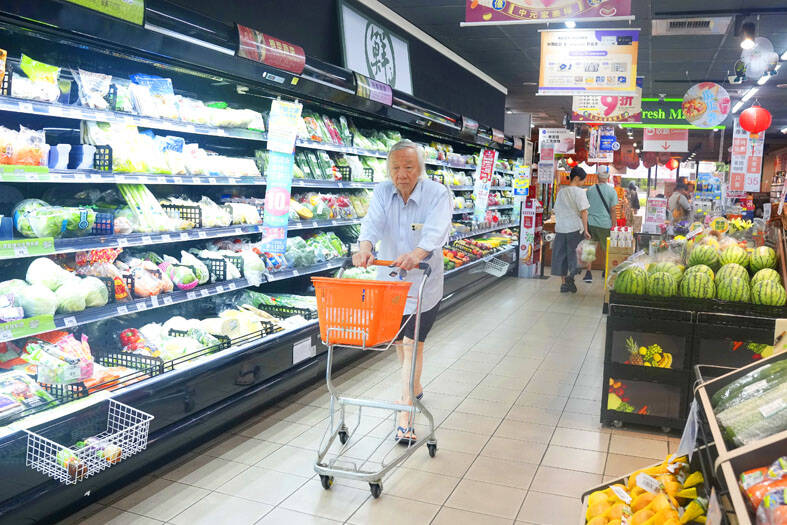Consumer confidence weakened further this month, sliding to its lowest level in two-and-a-half years as households grew increasingly uneasy about the economic outlook, job security and big-ticket spending, a survey by the National Central University showed yesterday.
The consumer confidence index fell 1.07 points from last month to 63.31, the weakest number since May 2023, said the university’s Research Center for Taiwan Economic Development (RCTED), which conducts the monthly poll.
“Although the Directorate-General of Budget, Accounting and Statistics recently increased Taiwan’s GDP growth forecast for this year to 4.45 percent, consumer sentiment tells a different story,” RCTED director Dachrahn Wu (吳大任) said.

Photo: CNA
Five of the six sub-indices dropped last month, with only confidence in stock investment showing an improvement.
The measure of household finances over the next six months fell to 75.15, the lowest in more than a year, while the gauge for the nation’s economic outlook slipped to 79.17, the weakest since early 2022.
Expectations for job opportunities also retreated to a 16-month low, underscoring rising concern about income security.
“Once people start to worry about their jobs and income, they are unlikely to spend,” Wu said, adding that private consumption has already shown signs of softening and is unlikely to speed up for the remainder of the year.
The steepest drop came in the durable goods sub-index, which dropped 2.04 points to 94.53 — the lowest since July 2020 at the height of the COVID-19 pandemic. The category includes housing, cars and household appliances.
Demand could improve if Taipei cuts tariffs on US-made vehicles, but such a move remains unlikely in the near term, leaving sentiment subdued, Wu said.
While the government has reiterated that talks with Washington are ongoing, US negotiators have pressed Taipei to lift car tariffs.
Meanwhile, Taiwanese firms face the prospect of unpaid leave or job cuts as they grapple with tariff-related trade barriers threatening their competitiveness, Wu said.
The stock market confidence sub-index rose 2.09 points to 31.2, supported by strong equity performance and expectations of a US Federal Reserve rate cut next month.
However, tariffs would eventually weigh on exports and corporate earnings, casting a shadow over local equities, Wu said.
“Although stock investment confidence has improved, it remains at a very low level,” he said. “Tariffs would eventually weigh on Taiwan’s economic fundamentals and the stock market.”
The survey polled 3,135 adults by telephone from Monday to Thursday last week, with a margin of error of plus or minus 2 percentage points.

In Italy’s storied gold-making hubs, jewelers are reworking their designs to trim gold content as they race to blunt the effect of record prices and appeal to shoppers watching their budgets. Gold prices hit a record high on Thursday, surging near US$5,600 an ounce, more than double a year ago as geopolitical concerns and jitters over trade pushed investors toward the safe-haven asset. The rally is putting undue pressure on small artisans as they face mounting demands from customers, including international brands, to produce cheaper items, from signature pieces to wedding rings, according to interviews with four independent jewelers in Italy’s main

Japanese Prime Minister Sanae Takaichi has talked up the benefits of a weaker yen in a campaign speech, adopting a tone at odds with her finance ministry, which has refused to rule out any options to counter excessive foreign exchange volatility. Takaichi later softened her stance, saying she did not have a preference for the yen’s direction. “People say the weak yen is bad right now, but for export industries, it’s a major opportunity,” Takaichi said on Saturday at a rally for Liberal Democratic Party candidate Daishiro Yamagiwa in Kanagawa Prefecture ahead of a snap election on Sunday. “Whether it’s selling food or

CONCERNS: Tech companies investing in AI businesses that purchase their products have raised questions among investors that they are artificially propping up demand Nvidia Corp chief executive officer Jensen Huang (黃仁勳) on Saturday said that the company would be participating in OpenAI’s latest funding round, describing it as potentially “the largest investment we’ve ever made.” “We will invest a great deal of money,” Huang told reporters while visiting Taipei. “I believe in OpenAI. The work that they do is incredible. They’re one of the most consequential companies of our time.” Huang did not say exactly how much Nvidia might contribute, but described the investment as “huge.” “Let Sam announce how much he’s going to raise — it’s for him to decide,” Huang said, referring to OpenAI

The global server market is expected to grow 12.8 percent annually this year, with artificial intelligence (AI) servers projected to account for 16.5 percent, driven by continued investment in AI infrastructure by major cloud service providers (CSPs), market researcher TrendForce Corp (集邦科技) said yesterday. Global AI server shipments this year are expected to increase 28 percent year-on-year to more than 2.7 million units, driven by sustained demand from CSPs and government sovereign cloud projects, TrendForce analyst Frank Kung (龔明德) told the Taipei Times. Demand for GPU-based AI servers, including Nvidia Corp’s GB and Vera Rubin rack systems, is expected to remain high,